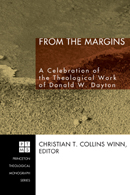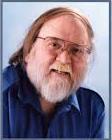Christian Collins Winn: From the Margins
 Christian T. Collins Winn, ed., From the Margins: A Celebration of the Theological Work of Donald W. Dayton (Eugene, Oregon: Wipf and Stock, 2007), 433 pages, ISBN 9781556351358.
Christian T. Collins Winn, ed., From the Margins: A Celebration of the Theological Work of Donald W. Dayton (Eugene, Oregon: Wipf and Stock, 2007), 433 pages, ISBN 9781556351358.
The editor of this volume has accomplished his purpose (publishing a Festschrift), celebrating the work of Donald W. Dayton. For those who are unfamiliar with Dayton’s writing, this book will serve as an introduction to the width and depth of his contribution to the Pentecostal church. For those who have read some of Dayton’s works, this book will expand and refresh their remembrance. The introduction of the book included an apt summation in the orientation of the book as being as much Fest [German, celebration] as Schrift [German, writing]. The format of this book followed the various articles that Dayton wrote, and then two responses were given for each article. Some of the responses gush with accolades for Dayton, in a manner that is foreign to the academic genre. Some of the responses are stiff with academic formality, which seem out of step with the tone of the book. However, all of the responses appropriately affirm the significance of Dayton’s contribution.

Now retired, Donald W. Dayton, taught theology and ethics at North Park Seminary, Northern Baptist Theological Seminary, Drew University, and Azusa Pacific University. He is the author of numerous books including Theological Roots of Pentecostalism (Scarecrow 1984) and Discovering an Evangelical Heritage (Harper & Row 1976).
The diversity of these articles establishes the range of Dayton’s thinking. These include the history of the Holiness and Pentecostal Movements, the need for social justice, the influence of Wesley, and foundational element Pietism. The argument for biblical feminism is engaged by Dayton and he seems to take particular delight in confronting this area of hypocrisy in the church. Moreover, Dayton employs both ecumenism and Barth in lively dialogue, to the delight of this reviewer. The growing influence and academic contribution of the church in Korea is engaged by Dayton as he relates his experiences with Korean scholars. In addition, a fascinating chapter on James Dean (the rebel without a cause) will jar the reader to think again, and to revisit the dusty memory of a fading American icon.
A rather amusing response is given by Dayton, as a closing self-commentary on this book and on his life-long work. He opens his life story for us to see the beginning, middle, and continuance of his journey. Candidly, he invites the reader to discover his roots, and perhaps to identify with his youthful rebellion and with the labor of maturity. While this book may stretch those who are uncomfortable with the academic genre, it is certainly well worth the reader’s effort. Undoubtedly, every reader will find a reward in some or all of its chapters.
Reviewed by John R. Miller
Publisher’s page: Wipf and Stock
Category: In Depth, Spring 2008


